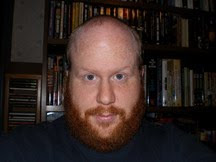This post is appropriate to the season. Fall is the time when everything dies, and Halloween is the time when the veil between life and death is the thinnest and the dead may return (hopefully not as zombies). It's the only time of the year when it's socially acceptable to put up images of skulls, skeletons, and other morbid things.
Which got me thinking: what can we know about what happens after death? And my answer is: nothing. Once our bodies die, once our brains die, all our knowledge ceases. Everything we can know comes from our experiences, and all our experiences are created by our brain. Everthing. It's all chemical and electrical processes. When your brain's dead, you can know nothing and experience nothing. Near-death experiences, you say? I can wire your brain up and cause you to have one just by stimulating parts of your brain. I can inject you with a drug called DMT (I think) that will cause you to experience alien abduction even though you're in a bed in a lab being watched by doctors all the time. Any experience, whether "real" or not, is a function of your brain.
Now let me tell you a lie. Let me tell you that there are two types of knowledge which we'll call lower and higher. The lower knowledge I've just described. We'll use it's Latin name, scientia. On the Tree of Life, it's represented by Malkuth (the Kingdom), the tenth and final Sephirot. It's also called Shekinah, the Presence. In one version of the Tree, it takes two forms. It takes the familiar form with Malkuth at the bottom. There's an earlier form, however, with no Malkuth. Instead, more towards the top, there's a Sephirot called Daath. Daath represents the higher knowledge. I prefer to use the Greek word gnosis for this. This knowledge isn't dependent on experience; technically, you can't experience it. It's beyond all experience and knowledge (scientia). It's the great dilemma of every single mystical system I care to name how to experience that which cannot be experienced. I said this was a lie, didn't I? It's a lie because words can't explain what brain can't know. The paradox is that all mystical systems try to explain it anyway in order to get its followers to experience it. That's right, the it that can't be experienced. Or even talked about. Yet it is on both counts.
On this Tree, Daath falls and becomes Malkuth. In a sense, this represents the formation of the ego. An infant doesn't conceive of itself as a separate being. The ego is the mental construct that allows us to think of ourselves as a separate and independent being apart from everything else. The knowledge of ourselves as everything is lost (so to speak, since its not really knowledge at all) and the knowledge of ourselves as ourselves begins. I was watching the movie Excalibur recently, and Merlin expressed the same thing I'm saying. He talked about an earlier time when everything was one. During this time, the sword of power was forged. My friends asked how a sword could be forged during a time of oneness and peace. My response was that it's forging probably ended the time of oneness. The sword can be a representation of the ego. In some mythology, the sword is forged, broken, and re-forged (as happens in Excalibur). This can represent the initial formation of the ego, its disillusionment that it's really separate (or even real), leading to its destruction and re-formation. The re-formed ego realizes it's an illusion, but a necessary one.

